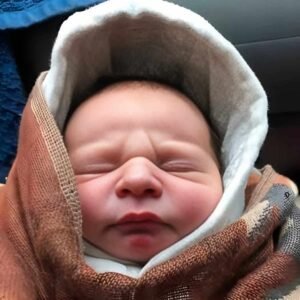The courtroom of the State Superior Court was tense that morning. Rain pressed against the gray windows as though the sky itself was listening. On the defendant’s side sat Darius Moore, a hardworking mechanic, charged with fraud and obstruction of justice. The prosecutor insisted he forged paperwork to steal money from the auto shop where he worked. The evidence looked convincing: signatures, bank transfers, testimonies.
But to Darius, it felt like his life had already been judged before he even entered the room.
And presiding over it all was Judge Raymond Callaghan, known for his harsh sentences, strict adherence to procedure, and his wheelchair. The accident that killed his wife had left him with severe nerve damage—he could walk short steps with support, but rarely did. His stillness gave him an intimidating, immovable presence.
When the prosecutor requested a 15-year sentence, everyone expected Judge Callaghan to agree.
That’s when the doors opened.
A small girl—about seven—marched down the aisle. Her hair was damp from the rain, and her shoes squeaked softly across the marble. People murmured—no one stopped her. It was as if something about her made the room pause.
She stood before the judge, chin raised.
“My name is Hope Moore,” she said, voice trembling but loud enough to echo. “Let my dad go… and I’ll release you.”
At first, people laughed. Lawyers. Observers. Even jurors. It sounded childish, dramatic—something from a storybook.
But Hope didn’t flinch.
“You think my dad is guilty because of papers,” she said, her hands balled tightly. “But I brought something too.”
She held up a worn folder.
Inside were photographs, timestamps, and copies of the overwritten signatures—ones that clearly didn’t match Darius’s handwriting. She had spent nights comparing them, tracing them, asking her teacher and neighbors to help her understand.
But that was not the shocking part.
The final page contained a name:
Martin Harlow—the shop owner—who had been investigated before for insurance fraud.
And then the room fell into stunned silence.
Because that was not public information.
No one was laughing now.
Judge Callaghan’s eyes narrowed.
“Come to the bench,” he said.
Hope stepped forward.
Their eyes met.
The tension was electric.
The courtroom air shifted—no longer dismissive, no longer amused. There was something about the way the little girl stood there, steady and unwavering, that demanded attention.
Judge Callaghan leaned forward. “Bring the folder to the bench,” he instructed.
Hope carefully handed the documents to the bailiff, who placed them in front of the judge. Callaghan adjusted his glasses—something he rarely did in public. His courtroom reputation was built on efficiency, not on hesitation.
He began to read.
First page: the work logs. Darius had been scheduled off during the alleged signature dates.
Second page: a copy of the bank transaction. The receiving account didn’t belong to Darius—it belonged to a shell company under Harlow’s nephew.
Third page: the handwriting comparisons. Childlike, yes—but undeniably clear. The forged signatures had inconsistencies that even a layperson could identify.
Murmurs rippled through the room. The prosecutor shifted, sweat gathering at his collar. He glanced at Harlow, who sat stiffly behind him. Darius, still in the defendant’s chair, stared at his daughter—eyes wide with disbelief and awe.
Callaghan continued flipping pages until his hand paused at the final document: a prior fraud investigation file. The same business. The same owner. The same pattern.
The judge’s jaw tightened.
“Mr. Reynolds,” he addressed the prosecutor, voice low, “were you aware of this prior case?”
Reynolds swallowed. “That file was sealed, Your Honor.”
“And yet,” Callaghan said slowly, “a seven-year-old child obtained it.”
All eyes turned to Hope.
She swallowed hard and explained, “My teacher… Ms. Patel. She said sometimes you have to ask the right questions to the right people.” Her voice shook slightly, but she stood firm. “So I asked.”
Not magic. Not miracles.
Just persistence.
And love.
Callaghan looked at Darius—the man the system had all but decided was guilty. Then he looked at Hope, whose belief never wavered.
Something inside him shifted.
He placed his hands on the armrests of his wheelchair. For years, he had remained seated—not because he couldn’t stand, but because standing invited memories he didn’t want to face. Memories of his wife. Memories of the crash. Memories of a life that felt stolen.
But justice required presence.
Slowly, deliberately, using the strength that physical therapy had returned to him, he rose. Not perfectly. Not effortlessly. But steadily—like a man choosing to stand for what mattered.
The courtroom gasped—not because it was miraculous, but because it symbolized something heavier than bone and muscle.
It was a declaration:
This case would not be judged by habit.
“Court will recess for one hour,” Callaghan announced, now fully upright. “I will review every piece of evidence independently.”
The bailiff called order. The courtroom buzzed with shock and rapid whispers.
Hope walked back to the defense table, her small hand sliding into her father’s.
Darius whispered, voice breaking, “You saved me.”
But Hope shook her head, eyes shining.
“No, Daddy. I just showed them the truth.”
The courtroom reconvened after the hour recess, though to many, it had felt like a day. Reporters had gathered. Harlow—the shop owner—now sat stiff and pale. The prosecutor avoided eye contact with everyone. And Darius, hands still cuffed, waited with a quiet desperation that only a father fighting for his child could understand.
Judge Callaghan returned—not in his wheelchair this time, but standing, supported by the bench behind him. The room fell silent.
“This court has reviewed the evidence provided by both the prosecution and the defense,” he began, his voice steady. “The original case against Mr. Moore relied heavily on documentation and witness testimony from Mr. Martin Harlow and his associates.”
He paused, letting the weight of his words settle.
“However, the newly submitted evidence reveals inconsistencies in the signatures, unexplained financial transfers, and a previously sealed fraud investigation involving Mr. Harlow.” His gaze shifted sharply toward the business owner, who now sat trembling.
A restless stir moved through the room.
“Mr. Reynolds,” Callaghan addressed the prosecutor, “your office proceeded with this case despite the existence of prior fraud allegations tied to your key witness. Did you verify the authenticity of the signatures or the financial records independently?”
Reynolds swallowed. “We… relied on the statements provided, Your Honor.”
“That,” Callaghan said, voice firm, “is not sufficient practice for prosecuting a man’s life.”
He turned to the defendant’s table. Darius held his breath. Hope clung to his arm.
“Mr. Moore,” the judge continued, “this court finds that the evidence against you is insufficient. The charges are dismissed. You are free to go.”
It was as though the room exhaled all at once.
Hope let out a cry of relief. The cuff keys jingled as the bailiff unlocked her father’s wrists. Darius lifted his daughter into his arms, holding her with the kind of embrace that comes from surviving something that nearly took everything.
Tears slid down his face—tears he didn’t bother hiding.
But Callaghan wasn’t finished.
He shifted his attention to Harlow.
“And regarding Mr. Martin Harlow—this court orders an immediate investigation into his business practices, financial records, and prior case files. Bailiff, escort him into custody pending further review.”
Gasps. Movement. Chaos.
Harlow was led out—no longer accuser, but accused.
When calm returned, Callaghan looked at Hope.
“You didn’t just defend your father,” he said. “You reminded this court what justice should look like—truth guided by courage.”
Hope gave a shy, watery smile.
Darius spoke through emotion-thick words, “Thank you, Your Honor.”
Callaghan shook his head.
“No. Thank her.”
The father and daughter walked out of the courthouse hand-in-hand—free, together, unbroken.
And Judge Callaghan remained standing—no miracle, no magic—just a man who finally chose to rise.





